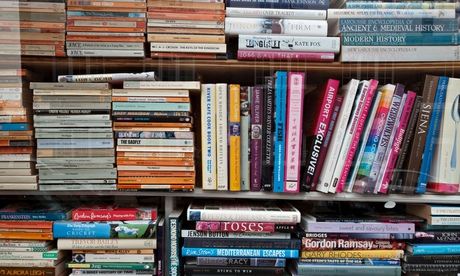
If an Englishman's home is his castle, then Ofcom's latest survey suggests most battlements are still lined with books, with the average UK adult's literary collection amounting to some 86 volumes.
According to Ofcom's annual communications market report (PDF), the largest collections were held by the 55-64 age group, with an average of 118 books, while the smallest were those of 16-24-year-olds, with an average of 50 books each.
Ebook collections were much smaller across the board, with average UK adults owning 19 ebooks. The largest number of ebooks were held by 45-54 year olds, who had an average of 22, while 16-24-year-olds had the smallest, at just 12.
The report shows a small decline in the number of books owned since 2005, when the average adult owned 89 physical books, and 93% of UK adults had a physical book collection. In April 2014, 84% of UK adults had a physical book collection, said the report – though they spend considerably less time reading them than using other forms of entertainment. UK adults spend an average of 20 minutes a day reading printed or electronic books, compared to an hour spent browsing websites and using computers, and almost three hours watching television.
According to Ofcom, books are still more widely owned and used than DVDs and music CDs.
"Despite the growth in digital media in recent years, forms of physical media remain popular," said the report. "Books were the most popular physical medium between 2005 and 2014. Eighty-four per cent of UK adults had a physical book collection in April 2014, down from 93% in 2005. Notwithstanding this decline, books are still more popular than DVD/Blu-ray discs (80%) and music CDs (79%)."
The news was welcomed by literacy organisations. "It's great to see so many people of all ages have a large book collection but it's also great that people can now choose a reading platform that suits them," said Viv Bird, chief executive of reading charity Booktrust.
Bird said the 9% drop in UK adults having a physical book collection was "more than made up for by the increase in digital book sales, which now represent 16% of total book sales", according to the Publishers Association. "Clearly, people are beginning to engage with books to a greater extent through digital platforms and in fact are reading more than ever."
Debbie Hicks, director of research at The Reading Agency, said the Ofcom report "confirm[s] that reading remains one of our most popular leisure activities", and also "reflects the changing ways that we are consuming written content in the digital age.
"Whilst the physical book remains important – whether owned at home or borrowed from libraries (who provide vital access to reading for people who may not be as able to afford to buy and own their own reading collections) – reading habits are changing as people increasingly read using digital platforms. Ultimately what matters is that people read, because of all the potential for increased life chances that reading offers," said Hicks.
The award-winning author Patrick Ness also felt the statistics were "hugely encouraging", although he wasn't entirely convinced. "I have a sneaking suspicion book owners are kind of all or nothing," said Ness, winner of the Carnegie medal. "I own about 3,000 – at a guess – it doesn't mean the guy next door who owns none has an average of 1,500 books in his house. I'll bet the country is riddled with people like both of us."

